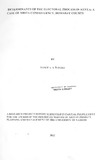| dc.description.abstract | This study investigated the determinants of the electoral process in Mbita constituency of
Homa bay County. The extent to which elections are free and fair is of central concern
particularly to countries struggling to democratise political life and establish multiparty
political and electoral systems. Free and fair elections can only be achieved in situations
where all the activities in the electoral circle are done as planned, without any hindrance.
The study has the following objectives: to determine the influence of ethnic-political
divisions on the electoral process in Mbita Constituency; to examine how socio-economic
status influence electoral process in Mbita Constituency, to establish how education level
influences the electoral process in Mbita Constituency and to examine how infrastructure
influences the electoral process in Mbita Constituency. The study employed descriptive
survey research design to establish the determinants of the electoral process in Mbita
constituency, Kenya. Data was collected from 225 eligible voters in Mbita constituency,
35 IEBC temporary staff of 2010 (registration and polling officers) and 13 politicians
(only those who had gone up to the ballot) and analysed using descriptive and inferential
statistics, including Chi Square and Pearson correlation coefficient and presented the
results in form of tables. It was established that ethnicity, socio-economic status,
education levels of all the participants in the electoral process and poor infrastructure
each affect the electoral process. It was concluded that Ethnicity is a key determinant of
the electoral process in Kenya. This was manifested through party affiliations and also
during elections. The study further established that respondents' denominations or
religion had no significant influence on the way people voted. Therefore, ethno-political
divisions had a significant influence on the electoral process. Those who were endowed
with resources are better placed to participate. These resources were highly correlated
with socio-economic status. This explained why men participate more. They are in charge
and therefore own the family resources. The main reason why some people voted
was because they expected to get some benefits from the candidates. Therefore, socioeconomic
status of respondents influenced the electoral process. Education level has
influenced participation in the electoral process, with those who are better educated and
more affluent participating more either as voters or politicians. The study findings
pointed out that educational level of the eligible voters was crucial in determining
electoral process as the influence of education level on electoral process had a highly
significant association and finally, the constituency had no adequate roads, bridges, and
electricity and safe boats. Therefore, infrastructure negatively influenced electoral
process in Mbita Constituency. Therefore, the following recommendations were made:
there is need to reinforce the Kenyan laws to make it difficult for every tribe to form
'their' party; the electoral body and the government need to organize programmes to
equip the poor and the disadvantaged members of the community with civic education
while at the same time striving to provide at least secondary education to all citizens and
IEBC should be allowed to reject nominations ~f candidates who get nominated through
unfair means or are handpicked. The findings of this study will be useful to the Electoral
Management Body which is mandated to institutionalize a sustainable electoral process,
political parties, Ministry of Planning, academicians, researchers and other stakeholders
involved in the improvement of policies and practices on the electoral process. | en |

